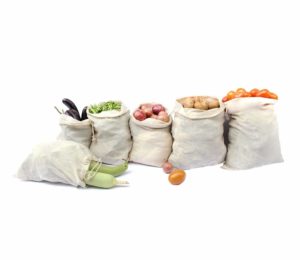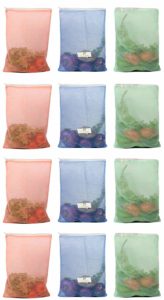Best Way To Store Vegetables And Fruits In A Fridge
We take a lot of measures to keep our fruits and vegetables fresh, one among them is to store them in a refrigerator. Let’s know what is the best way to store vegetables and fruits in a fridge.
We’re well aware of the fact of including fresh vegetables and fruits in our daily diet because they’ve lots of health & beauty benefits. But do you know how long can you keep them fresh once you bought them? Due to the changing weather and the atmospheric moisture, the fruits & vegetables are more likely to get spoiled. Once they get spoiled, they will no longer benefit you because they’ve lost all their essential nutrients. And we end up throwing them because we don’t want to eat rotten things. But the fact is some fruits or vegetables need to be consumed within a particular time, hours or days of buying.
Also, many of us can’t visit the stores daily to get fresh fruits or vegetables so we buy them at once. These days the most convenient and common practice to store fruits and vegetables in a fridge is to cut them before using them. But that’s not the right way of storing them. Cutting and storing vegetables or fruits before their use results in their oxidation. This, in turn, results in the loss of all the vital elements and nutrients present in them.
So, it becomes very important to know the best way of storing them so that you can keep them fresh and eat them fresh after their day of purchase. So what should be the best way you can do to preserve them fresh for a long time? Find below the answer and know the right way of keeping your vegetables and fruits fresh in a fridge. And also know which fruits and vegetables shouldn’t be kept inside a fridge.
Best Way To Store Vegetables and Fruits
Follow the below-given tips to keep your vegetables & fruits fresh longer to stay healthy and fit
Sort, Separate, and Wash
The moment you bring your fresh veggies & fruits home, make sure you sort them out first before storing them in the fridge. Sorting them will help you pick out the damaged or the spoilt ones. Then, give them a pre-wash under the cold water and dry them. Before storing vegetables and fruits, they should always be washed to get rid of the pesticides that are sprayed by the farmers to protect them from pests and insects. Prepare them to store separately, so that they don’t affect the freshness of each other. While storing them in the fridge, use the zipper or perforated cotton bags or paper bags which are specially meant for storing.

Best Way To Store Vegetables
- Green leafy vegetables like spring onions, coriander, spinach, fenugreek, mint should not be kept too long. Instead, they should be consumed in 1 or 2 of buying. But to store and keep them fresh, first remove their dead roots, stems, and leaves. Then clean them with a paper towel and then wrap them in a cotton towel before storing them in the fridge. Cotton towels will help your leafy vegetables keep their moisture intact. After that, place your leafy vegetables in a perforated zipper bag and then in the refrigerator crisper. Like this, they’ll remain fresh for at least 3 to 4 days. Don’t forget to wash them with water before using them.
- The best way you can store sprouts is to wash them first with water and remove their dead coats and roots. Then put them in a wet cotton towel then and place them in a perforated bag. Like this, sprouts can remain fresh in the fridge for several days.
- Vegetables like cauliflower, broccoli, beans, and cabbage are flavor absorbents. They can absorb flavors from the food already stored in the fridge. So they should be cut and stored correctly. If cut, they should be stored in an airtight container and consumed within 2-3 days. Ideally, they should be consumed the same day or the very next day of the purchase. But if kept whole, you can store them in perforated plastic or cotton bags in the crisper of the fridge for 2-3 days.
Eco-friendly Natural Cotton Fridge Bags for Fruits & Vegetables – BUY NOW
- Vegetables like radish, bottle gourd, beet, bitter gourd, and carrots dry out because they lose their moisture quickly. So the best way to store them is to remove their top and then wrap them in a damped cotton towel before putting them in the fridge. Peel their skin only at the time of use. Do not store them directly in an airtight container, otherwise, they’ll lose their moisture.
- Pumpkins and Drumsticks should be chopped and stored in an airtight container in the freezer. They will remain fresh for about a week without losing their essential nutrients.
- Peppers should be cut first and then stored in the fridge in an airtight container. They will remain fresh for about a week.
- Ginger and garlic can be stored in the fridge for 4 to 5 days. Remove their skin and store their pieces in an airtight container. Use them within 4 to 5 days otherwise, they will dry out and lose their nutrients.

Best Way To Store Fruits
To get the benefits of the maximum nutrients, fruits should always be consumed on the day of purchase or once they ripen. The flavor of fruits can be enjoyed once they get ripen. Ripen fruits are at their best flavors, but, they tend to spoil too quickly once they are ripened. Fruits can be stored in a refrigerator in the crisper at very low humidity conditions. However, you can also follow the following tips to keep them fresh for a longer period of time.
- Fruits like apples, figs, pears, peaches, and plums can also be stored fresh in the refrigerator for weeks. Store them in a paper bag in a dark and dry place. Store pear and peaches in the fridge only after they’ve ripened. But, apples and pears should be stored very carefully. Because they emit a natural plant hormone called ethylene gas that can affect theirs as well as the ripening of other fruits. Also when you store apples in the fridge the enzymes present in them become more active which ripens apples quickly.
- Check the skin of cherries and grapes before storing them in the fridge. Also, wash them and dry them before storing them. Use a perforated zipper bag for storing and do not store them for more than a week and also wash them before eating.
Reusable Mesh Fridge Storage Bags for Fruits and Vegetables – BUY NOW
- Pineapples should be eaten at once after purchasing because when you store a sliced pineapple it will spoil. If you want to store pineapple, then do not slice it and keep it whole in the refrigerator not for more than two days.
- You can also store berries in the fridge. Simply put berries in a bowl of hot water, wash them, then spread them on a towel for drying then store. Berries should be kept in the refrigerator in a paper bag with holes and should be consumed within 2-3 days of buying.
Vegetables And Fruits That Should Not Be Stored In A Fridge
Not every fruit or vegetable is required to be stored in the fridge, there are many vegetables and fruits which remain good when stored at room temperature.
- Potatoes contain starch that turns into sugar when stored in the refrigerator. So potatoes are better stored in a dry place outside the fridge. Store them in a container with holes without a polythene bag so they don’t get spoiled.
- Onions get spoiled when stored in a fridge. Like potatoes, store onions in a container with holes in a dry and dark place. Also, potatoes and onions should never be stored together. They release gas and moisture which can spoil the other when stored together.
- Tomatoes and green tomatoes tend to get tighten and lose their flavors and moisture when refrigerated. Also, the cold air of the refrigerator affects the ripening process of tomatoes. So they should be stored outside the fridge in a paper bag and away from sunlight.
- Bananas are tropical fruit that prefers a warm climate. So, they shouldn’t be stored in a fridge. The enzymes present in bananas hinder their ripening and turn their peel dark. Also, the Ethylene gas emitting from bananas affects the ripening process of other fruits stored in the refrigerator.
- Lemons and Oranges should be stored in a dry place because they are odor absorbents. They catch the odor of food stored in the refrigerator. Citrus fruit lasts for several weeks because of its thick skin. So, they can be stored at room temperature. Do not store them in an airtight container. Store them in a perforated plastic bag or a container with holes to allow proper air circulation.
- Never store fruits and vegetables together or in a completely airtight container or bags. Because it hinders the airflow which may result in the decomposing of your fruits and veggies. Avoid storing fruits or vegetables together that emit ethylene and moisture because they can spoil the other very fast. Green vegetables and ripe fruits should be used as early as possible.
Knowing the best way to store vegetables and fruits will keep your fruits and vegetables fresh longer and reduce the wastage of food.
You May Also Like
- Useful Kitchen Tips & Tricks
- Quick Kitchen Cleaning Tips
- 6 Cooling Recipes to try when it’s too Hot
- How To Stay Fit During Work From Home
- 5 Indian Recipes To Make This Holi




